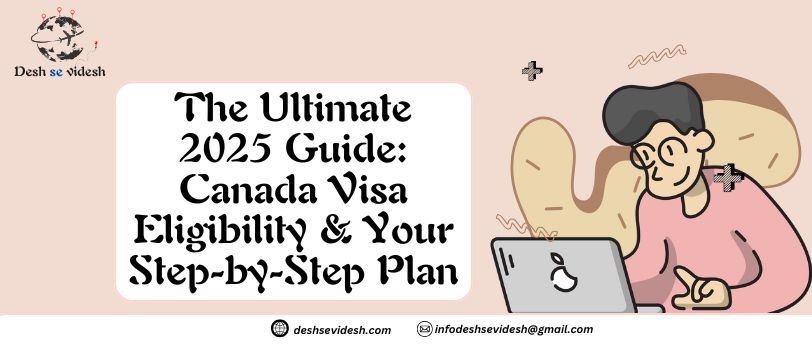2025 Guide: Canada Visa Eligibility & Your Step-by-Step Plan
Learn Canada visa eligibility rules & full 2025 plan.
6/20/20253 min read


You’ve been dreaming about moving to Canada — maybe for better job opportunities, world-class education, or simply a fresh start. But let’s be honest: when you start reading through immigration websites and forums, it all begins to feel confusing.
What’s the right visa program for me?
Do I even qualify?
How much money do I need to show?
This blog breaks it all down — in simple terms — so you understand who is eligible, what steps you need to take, and how to actually get there in 2025.
Whether you’re a student, working professional, or looking to reunite with family — this is your complete, no-nonsense Canada visa guide.
Who Is Eligible for a Canada Visa in 2025?
Eligibility depends on the type of visa you’re applying for, but here are some basic requirements that most applicants must meet:
A valid passport
No serious criminal background
Good health (medical exam may be required)
Sufficient funds to support yourself in Canada
English or French language skills (through IELTS or TEF)
Education or relevant work experience
Intention to leave Canada after your authorized stay (for temporary visas)
Let’s break it down further based on your visa type.
Choosing the Right Path: What Type of Visa Should You Apply For?
1. Express Entry (Permanent Residency)
This is the fastest and most popular pathway for skilled workers. It’s a points-based system where your CRS (Comprehensive Ranking System) score determines your chances.
You’re awarded points for age, work experience, education, and language skills. In 2025, the average CRS cut-off score has hovered between 470 and 510.
You don’t need a job offer to apply, but having one can boost your points.
2. Provincial Nominee Program (PNP)
Each province in Canada has its own PNP targeting specific occupations. If your job profile is in demand in a particular province, you can apply through that province and get nominated.
A nomination gives you 600 additional CRS points, practically guaranteeing PR.
3. Study Permit
Planning to study in Canada in 2025? You need:
An offer letter from a Designated Learning Institution (DLI)
Proof of funds to cover tuition + living expenses
IELTS score (usually 6.0 overall for most programs)
A Statement of Purpose (SOP) explaining your education goals
This visa is also a stepping stone to Permanent Residency through the Post-Graduation Work Permit (PGWP) and later, Express Entry.
4. Family Sponsorship
If you have a family member who’s a permanent resident or citizen in Canada, they may be able to sponsor your PR. This includes spouses, dependent children, and in some cases, parents or grandparents.
Step-by-Step Canada Visa Plan for 2025
Let’s walk you through the actual process, no matter what visa stream you choose.
Step 1: Check Your Eligibility
Use the official IRCC eligibility tool or consult a certified immigration consultant. Don’t guess — the rules change often.
Step 2: Book Your Language Test
For English, most programs require IELTS General (not Academic).
For French, TEF Canada is accepted.
Aim for CLB 7 or higher (equivalent to IELTS 6+ in each section).
Step 3: Get Your Education Assessed
If applying for Express Entry or PNP, get your academic degrees evaluated through WES, IQAS, or ICES. This confirms your education level under Canadian standards.
Step 4: Create Your Express Entry Profile (if applicable)
Once you’ve collected your test scores and education credentials, create a profile on the IRCC portal. It’s free. You’ll receive your CRS score instantly.
Step 5: Submit Full Application After Invitation
If you get an Invitation to Apply (ITA), you’ll have 60 days to submit all documents. This includes police clearance, medicals, proof of funds, and more.
Step 6: Wait for Decision
Processing time varies:
Express Entry PR: 6–12 months
Study Permit: 2–3 months
PNP: Depends on province
Family Sponsorship: 8–12 months
Common Mistakes to Avoid
Applying with incorrect or incomplete documents
Choosing the wrong visa stream
Submitting fake work experience or education (this leads to a 5-year ban)
Relying on unlicensed agents
Missing deadlines for submitting after an ITA
Why Plan Early?
The Canada immigration system works on a rolling basis. The earlier you start, the more time you have to:
Improve your language scores
Boost your CRS with additional certificates
Choose the right province
Gather clean and verifiable documents
Many applicants who begin early in the year secure their visas before year-end.
Need Expert Help?
At DeshSeVidesh, we’re not just a website — we’re your visa planning partners. Whether you’re confused about eligibility or need help preparing your documents, we’re here to guide you.
Follow us on for more updates
Instagram Page - instagram.com/desh_se__videsh
Let’s turn your Canadian dream into a real plan.
Frequently Asked Questions (FAQs)
Q: Can I apply for Canada PR without a job offer?
Yes. Express Entry does not require a job offer, though it improves your CRS score.
Q: Is IELTS mandatory for a Canada visa?
For most visa types (like Express Entry and Study Permits), yes. IELTS is accepted worldwide.
Q: Can I switch from a student visa to PR later?
Yes. Many international students apply for PR after gaining work experience through PGWP.
Q: Is there an age limit for Canada immigration?
While there’s no official age limit, applicants aged 18–35 generally score better in Express Entry.
Q: How long does it take to get a Canada visa?
Processing times vary. Express Entry PR takes 6–12 months, while student visas can be processed within 60 days.
